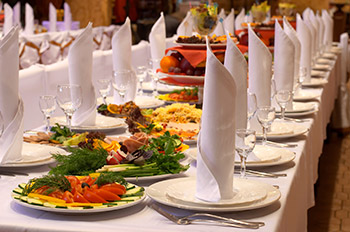September 1, 2019
Luke 14:1, 7-14
Eating a meal was a very structured affair in the ancient world. Guests were seated according to a clear hierarchy of importance. The place of honor was at the right hand of the host. The person who sat at the left hand was in second place. Other places of importance went down from there. At the very end of the table were the places for people of lowly importance: children, slaves, and women. (It was a patriarchal culture.) This order of status continues to our present day. It is usually dependent on how much we are willing to pay. If you are willing to pay, you can have seats close to the stage at a concert, you will not have to wait in line at amusement parks, and you will have more leg room when you fly the friendly skies.
Jesus uses this hierarchical order in today’s gospel. But what does he mean to say to us? Contrary to first impressions, Jesus is not giving us tips on how to secure the best place at dinner. The key to his words, as he says himself, is that his words are a parable. A parable is meant to reveal something about our relationship to God and to God’s kingdom. Usually the meaning of a parable rests on one key insight. Here is the insight I would suggest for today’s parable: it is all about the host. The host is the main character in the parable. The host determines who will sit in the place of honor and who will not. And the host in this parable is inclined to move people. He asks one man to take a higher place and another a lower one.
When we read Jesus’ words in the lens of a parable, he is telling us that the host is God, and the place we find ourselves in life is a result of God’s will. The parable also tells us that our place is likely to change. So if you find yourself today in a lowly place, if you are crushed because of the loss of someone you love in death and not sure that you can go on, this parable is a parable of hope. At any time God, the host, can come to you and say, “Here is something new. Here is a new beginning. My friend, move up higher!” If you find yourself working in a difficult perhaps even unjust situation, this parable asks you to hold on. A job is not forever, and God has the power to make things better.
On the other hand, if you find yourself today in a place of honor, if everything is going well, be glad. But know that you are not guaranteed that place always. You can be justly proud of your children and what they have accomplished professionally and personally. Rejoice. But remember it only takes one phone call for you to realize that the future of your family might now include divorce or dealing with addiction. Then you would have to move to a lower place. If you are blessed with good health, use it and enjoy it. If you can say that I am seventy years old and I still walk twenty miles a week, good for you. But remember in time you will be asked to take a lower place in that area of ability.
Our places move in life. Sometimes they move up, and sometimes they move down. Sometimes life is better, and sometimes life becomes more difficult. This parable tells us that God is our host who accompanies us in those changes. Sometimes God comes to us and says, “My friend, move up higher.” Other times God says, “I need you to sit here for a while.” But here is the good news of the parable: God, our host, loves us. He has invited us to the wedding banquet of his love. Therefore, in the end, the place in which we find ourselves is less important than the fact that we are at the table. The parable asks us to trust the host. To accept where we have been placed, always remembering that God’s love for us is secure. Whether we find ourselves seated high or low, God has invited us to the wedding banquet. And our host will certainly see that we have enough to eat.


Trusting the Host was excellent and so important to hear and meditate on. It applies to all but especially to us seniors who find ourselves in lower positions many times. How blessed we are to know that our Lord loves us no matter what position we are in